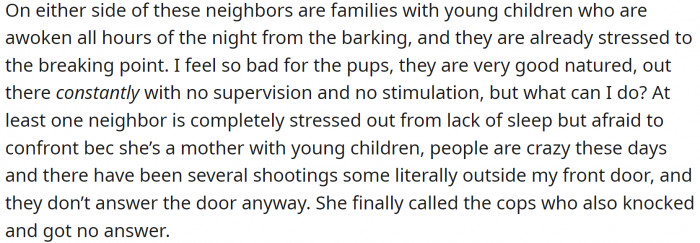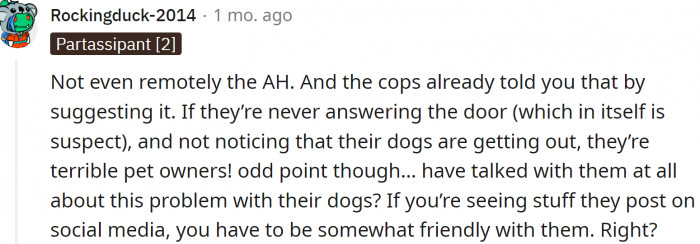Redditor Is Annoyed By His Neighbor’s Lack of Care For His Dogs, So He Takes Them To A Shelter When They Escape From Their Yard
Dogs are very lively and social beings. If they don’t get enough stimulation, they can develop some irritating habits. Responsible owners know how to keep their dogs stimulated and balanced.
However, not every dog owner is responsible. What happens if you live next to one?
One Reddit user posted his problem:
“New neighbors moved in and have several dogs, including two half-grown puppies. They have a fenced-in yard and an enclosed porch. They leave the dogs out all. the. time. Day or night, rain or shine. They don’t seem to have any toys or anything to stimulate or distract them. So, of course, they bark. All. the. time.”
Neighbors are furious.
“On either side of these neighbors are families with young children who are awakened at all hours of the night by the barking, and they are already stressed to the breaking point. I feel so bad for the pups; they are very good-natured, out there constantly with no supervision and no stimulation. But what can I do?
At least one neighbor is completely stressed out from lack of sleep but is afraid to confront them because she’s a mother with young children. People are crazy these days, and there have been several shootings, some literally outside my front door, and they don’t answer the door anyway.”
The neighbor finally called the cops, but no one answered the door when they came. One night, the dogs escaped from the yard. The neighbors picked them up and returned them to their yard.
But the cops told them that in situations like these, they are free to take the dogs to a shelter. That’s what they did the next time. Needless to say, the irresponsible dog owner was not happy.
OP asks:

They shared their problem

All neighbors are furious

The Ethical Dilemma of Dog Ownership
The decision to take a neighbor's dogs to a shelter raises significant ethical questions about responsibility and community engagement. Dr. Karen Hall, a community psychologist, explains that responsible pet ownership involves not only caring for one's own animals but also looking out for the welfare of others' pets.
Research indicates that communities that promote responsible pet ownership experience lower rates of abandonment and neglect. Encouraging individuals to engage with neighbors about pet care can foster a culture of accountability and support.
The Ethics of Pet Ownership
The Redditor's decision to take their neighbor's dogs to a shelter raises important ethical considerations regarding pet ownership and responsibility. Research shows that owners who neglect their pets can contribute to significant distress for both the animals and the community.
Studies published in the Journal of Veterinary Behavior indicate that neglected pets often exhibit behavioral issues stemming from a lack of care and socialization, which can pose risks to other animals and people.
The cops advised them what to do

And they did it. Now the dog owner is not happy.

Their dogs - their responsibility

Understanding the motivations behind taking action against perceived neglect is crucial. Studies show that individuals often act out of a sense of moral obligation when they believe animals are being mistreated.
Dr. Emily Carter, a veterinarian, notes that while the intention to help is commendable, it’s essential to approach such situations with caution and consider potential consequences for all involved. Open communication with pet owners can lead to more effective solutions.
Moreover, community dynamics play a crucial role in shaping how we perceive and respond to neglectful ownership. A study from the University of Michigan found that neighborhoods with strong community bonds tend to have lower rates of animal neglect and higher levels of responsible pet ownership.
Keep logging these complaints

Animals have very little legal protection

These neighbors won't even answer the door

The Role of Community in Pet Welfare
Community involvement is vital for promoting animal welfare and responsible pet ownership. Research shows that neighborhoods with strong support systems for pet care experience better outcomes for both animals and owners.
Dr. Rachel Green, a veterinary behaviorist, emphasizes the importance of fostering a culture of compassion and responsibility among pet owners. Community initiatives, such as awareness campaigns and training workshops, can significantly enhance the well-being of pets.
Navigating Neighborly Disputes
Resolving conflicts between neighbors over pet care requires tact and understanding. Effective communication can often prevent misunderstandings and foster collaborative solutions.
Research in the field of conflict resolution highlights that open dialogues can lead to improved relationships and more effective problem-solving strategies.
They peek through the windows...

Some people shouldn't have dogs

Check the city code, OP. There has to be something about the noise

Understanding the underlying causes of neglect or abandonment can inform better community practices. Studies indicate that many pet owners may struggle with resources, knowledge, or support, leading to unintentional neglect.
According to research published in the Journal of Veterinary Behavior, providing educational resources and support can empower pet owners, reducing the likelihood of neglect and promoting responsible ownership.
Additionally, community resources, such as mediation services, can provide valuable support in resolving disputes over pet ownership responsibilities. According to the American Psychological Association, these services can facilitate constructive conversations and help maintain harmony in neighborhoods.
A dog may bark as a warning, an invitation, a distress cry, or simply as a sign of happiness. Although there are different causes for barking, it is usually a sign that your dog is trying to say something. Your dog may repeatedly bark in a high-pitched voice if it is anxious or disturbed.
But whatever the reason may be, you should react. One of the strangest things is people who get dogs to protect their properties and don't teach them not to bark at everything they see.
The point is for the dog to alert you to dangers with its barking. How will they know if the dog is barking to warn of hazards or just because it is used to?
Dog owners have so much to learn, that's for sure.
The Importance of Responsible Pet Ownership
Ultimately, responsible pet ownership is crucial for the welfare of animals and community well-being. Ensuring that pets receive adequate care and attention can prevent conflicts and promote positive relationships between pet owners and their neighbors.
Research emphasizes that communities with engaged pet owners are more likely to create safe and supportive environments for all residents.
Psychological Analysis
This situation illustrates the complex dynamics of pet ownership and community responsibility. It's crucial to recognize the impact of neglect on both animals and neighborhoods.
By promoting responsible ownership and engaging in open dialogues, we can foster healthier relationships within our communities.
Analysis generated by AI
Analysis & Alternative Approaches
The decision to intervene in a neighbor's pet care raises complex ethical questions about responsibility and community dynamics. By fostering responsible pet ownership, we can mitigate conflicts and enhance the well-being of both animals and community members.
Ultimately, promoting open communication and collaboration among neighbors is essential for creating harmonious living environments.
Communication and Conflict Resolution
Effective communication is critical in resolving conflicts related to pet ownership. Research in conflict resolution emphasizes the importance of understanding the concerns of all parties involved.
Dr. Michael Thompson, a conflict resolution expert, suggests that engaging in open dialogue can foster mutual understanding and lead to collaborative solutions. Encouraging discussions about pet care can help prevent escalation and promote community harmony.
Analysis & Alternative Approaches
Addressing the ethical and community aspects of pet ownership is essential for promoting animal welfare. Research consistently highlights the importance of communication, education, and community involvement in fostering responsible pet ownership and enhancing the well-being of pets.
Ultimately, creating a culture of compassion and responsibility can lead to better outcomes for both animals and their owners, benefiting the entire community.



